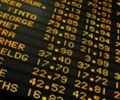

Chinese growth and corporate earnings in the United States and Europe, including results from the big-hitting FAANGs, will give markets plenty to digest in the week ahead, while Turkey’s central bank is set to meet after another midnight reshuffle.
And for many, the big question: Is Christmas cancelled?
1/CHARTING CHINA
From an Evergrande-induced property market crisis to power shortages halting production lines supplying Apple and Tesla, the world’s no. 2 economy has plenty to worry about.
A good gauge of the fallout comes with Monday’s Q3 GDP figures and other keenly-watched data points, from factory production to retail sales.
Economists forecast China’s economy grew 5.2per cent year-on-year, the weakest reading in a year, amid power rationing, persistent supply bottlenecks and soaring commodity prices, all as consumption languished amid sporadic COVID-19 flare-ups.
The real estate sector, a key growth driver, is reeling from rising defaults, with sales tumbling and construction slowing. Still, few expect the central bank to ride to the rescue, for fear of fomenting bubbles in debt and property prices.
2/PROFIT STREAM
Netflix kicks off third quarter reporting on Thursday for the ‘FAANG’ group of big U.S. tech and growth companies of Facebook, Apple, Amazon, Netflix and Google-parent Alphabet.
The video streaming company said “Squid Game” has become its biggest series launch ever, while last month “The Crown” won the best drama series Emmy award. Netflix also bought video game creator Night School Studio in a push to diversify.
Netflix’s stock price has climbed some 16per cent in 2021, broadly in line with the S&P 500 and in the middle compared to the other FAANG stocks. Other companies due to report results next week include Tesla, Johnson & Johnson, and Intel.
3/INFLATION SPOTTING
Markets will look for signs that production bottlenecks, supply chain strains, labour shortages and surging energy prices are starting to undermine future profits when Europe’s earnings kick off.
With rates hikes in the works to fend off inflation stickiness, financial and energy sectors are set to thrive as rising yields dent the appeal of so-called growth stocks.
Tasters of the third-quarter earnings season from luxury giant LVMH, tech star SAP and steelmaker Outokumpu so far left no bitter after-taste. Now it is the turn of blue chips such as ASML Holding, Unilever, Barclays and ABB.
Earnings are seen jumping 46.7per cent year-on-year for pan-European STOXX 600 index constituents, though the gap between positive and negative revisions has been shrinking, vindicating the narrative Europe is cruising past peak growth.
4/CHRISTMAS, CANCELLED?
A year after coronavirus lockdowns dampened festive spirits, world leaders will be hoping supply disruption won’t be the Grinch that stole Christmas.
It may be more than two months away, yet panic buying of turkeys and festive goodies has begun amid supply chain chaos.
White House officials warn Americans may face higher prices and empty shelves this Christmas. The busy ports of Los Angeles and Long Beach are expanding operations to unload an estimated 500,000 containers waiting on cargo ships offshore.
Britain has urged consumers to buy normally after containers carrying toys and electrical goods were diverted from its biggest port because it was full.
Friday’s October flash purchasing managers indices (PMI) from Australia, Europe and elsewhere might illustrate supply chain pain. Germany business sentiment is already suffering.
5/EMERGING WOES
Central banking is rarely dull in emerging markets, but Turkey outstrips most others for excitement.
A fresh batch of policy makers will meet on Thursday after President Tayyip Erdogan instigated another reshuffle, clearing the way for more rate cuts in the face of stubbornly high inflation and sending the lira to fresh record lows.
But central banks elsewhere are busy ramping up rates. Hungary is expected to nudge up its benchmark on Tuesday to tackle a rise in inflation which prompted sharp rate rises elsewhere in central Europe.
Russia’s central bank will likely follow on Friday as policy makers have come out in droves warning of rising price pressures and unanchored inflation expectations.
Source: Reuters (Reporting by Kevin Buckland in Tokyo, Danilo Masoni, Dhara Ranasinghe, Julien Ponthus and Karin Strohecker in London, Lewis Krauskopf in New York; compiled by Karin Strohecker; editing by Alexander Smith)